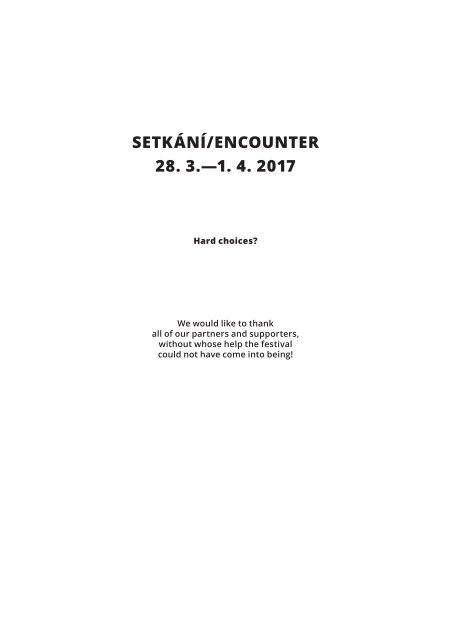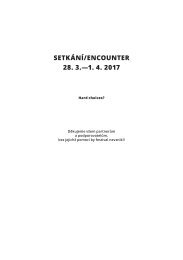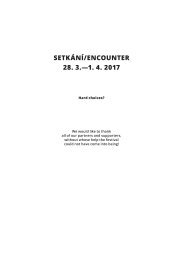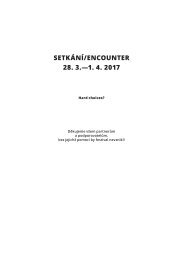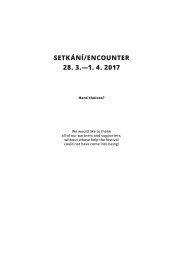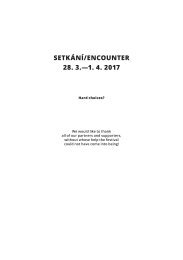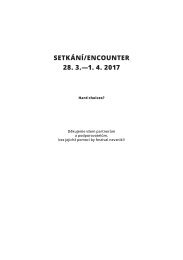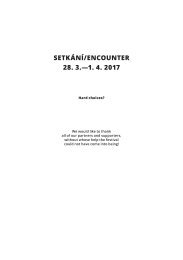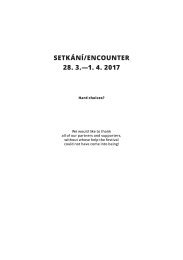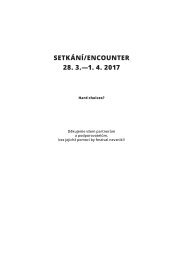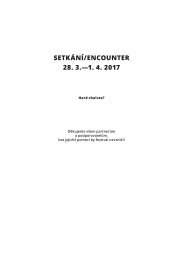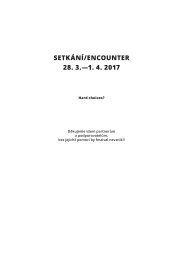You also want an ePaper? Increase the reach of your titles
YUMPU automatically turns print PDFs into web optimized ePapers that Google loves.
SETKÁNÍ/<strong>EN</strong>COUNTER<br />
28. 3.—1. 4. 2017<br />
Hard choices?<br />
We would like to thank<br />
all of our partners and supporters,<br />
without whose help the festival<br />
could not have come into being!
Head Editors in Chief:<br />
Adam Harton<br />
Ilona Pawerová<br />
Assistants of Head Editor in Chief:<br />
Nikol Hlávková<br />
David Šamánek<br />
Editors in Chief:<br />
Paulína Mazíková<br />
Monika Okurková<br />
MEETING POINT<br />
The International Festival of Theatre Schools<br />
SETKÁNÍ/<strong>EN</strong>COUNTER 2017<br />
Editors:<br />
Libor Brzobohatý, Lenka Dobrovolná, Lucie Hrochová, Pavla Kopřivová, Jana Kühn,<br />
Martina Ligurská, Jiří Liška, Magdaléna Milostná, Jan Motal, Jan Neugebauer, Karolina<br />
Ondrová, Lubica Omastová, Šimon Peták, Anna Ročková, Dagmar Říhová, Marek<br />
Slováček, Miroslav Sýkora, Milada Váchová, L’ubomír Višňovec, Markéta Tulisová<br />
Photographers:<br />
Matouš Ondra, Anna Turková, Rudolf Vodička<br />
Comic:<br />
Eva Polgary<br />
Translators:<br />
Sára Galová, L’ubomír Višňovec, Lucie Kelčová, Vojtěch Marszalek, Eliana Denkocy,<br />
Barbora Schejbalová, Adéla Svídová, Zuzana Kernová<br />
Proofreading of the English Version:<br />
Adrian Hundhausen<br />
Proofreading of the Czech Version:<br />
Anna Burianová, Lucie Říhová<br />
Typesetting:<br />
Kevin Wulfric Scherrer<br />
Publisher:<br />
Janáčkova akademie múzických umění v Brně<br />
Divadelní fakulta<br />
Mozartova 1, 662 15 Brno<br />
IČ: 62156462 | DIČ: CZ62156462<br />
2
CONT<strong>EN</strong>T<br />
THEME OF THE FESTIVAL . 4<br />
EDITORIAL . 5<br />
THE OP<strong>EN</strong>ING CEREMONY. 6<br />
BEHIND THE SC<strong>EN</strong>ES . 7<br />
WORKSHOP. 8<br />
MAIN PROGRAMME. 9<br />
OFF–PROGRAMME. 15<br />
PROGRAMME. 16<br />
PHOTOGALERY. 18<br />
INFORMATION . 21<br />
COMIC . 25<br />
FREQU<strong>EN</strong>CY BABYLON. 26<br />
10 WORDS. 27<br />
THANKS. 28
THEME OF THE FESTIVAL<br />
HARD CHOICES?<br />
„The amount of information we deal with on a daily basis provides us with so many<br />
options, but we are also under the attack of too much news, an overdose of information<br />
— we have to find our bearings. ‚HARD CHOICES‘ symbolises this phenomena, that<br />
is now an unconditional part of our society. One is confronted with many different<br />
opinions, that are generously opening doors to new points of view, whilst closing them<br />
at the same time.”<br />
Alexandra Bolfová and Martin Hodoň<br />
Department of Theatre Directing and Theatre Dramaturgy<br />
4
EDITORIAL<br />
First day of Encounter. Czech girl sits in the Meeting Point Office, Slovak girl is at a performance.<br />
They haven't really met today. There was barely any encounter, so it's difficult<br />
to overhear their dialogue.<br />
Couple of hours later in front of DIFA JAMU:<br />
M: The performance 'Stab the Hens' is over?<br />
P: Yes. (Runs away from DIFA)<br />
M: Where are you going?<br />
P: (From afar) To HaDi!<br />
Czech girl returns to the office to proofread articles. The Slovak girl and the Cech girl<br />
still haven't really encountered at the Encounter.<br />
Evening. Slovak girls arrives to the office.<br />
P: Are you doing something?<br />
M: Yeah I kinda am…<br />
P: Perhaps we could take a look at the editorial…<br />
M: I am working on it talready… More or less.<br />
P: Ah, okay. I'll go to the grocery store then. Want something?<br />
M: Food!<br />
P: Savoury or sweet?<br />
M: Savoury… and a Kinder Bueno!<br />
Slovak girl calls from the store. Czech girl picks up the phone.<br />
P: Believe me or not, they're out of Kinder Bueno.<br />
M: Hard choices, eh… okay, I'll take Mila then.<br />
Meanwhile two managers speaking, still in the office.<br />
S: How is the big ice cube doing?<br />
F: Freezing.<br />
S: Great.<br />
And so the Czech girl and the Slovak girl hope that they will encounter more tomorrow.<br />
But they are really glad the office is working. And that the big ice cube is freezing.<br />
The editorial bonus: First person that finds out the purpose of the big ice cube at the<br />
festival and tells it to one of the Editors in Chief in person, will win a special price. Right<br />
after they find out who the Editors in Chief are. And how they look like. And also where<br />
is the Meeting Point Office.<br />
And finish this editorial.<br />
Paulína Mazíková a Monika Okurková<br />
Šéfredaktorky Meeting Point<br />
5
THE OP<strong>EN</strong>ING CEREMONY<br />
HI FESTIVAL!<br />
Tuesdays are just perfect for starting the festival!<br />
Especially a Tuesday like yesterday. The sun was shining and it was beautifully warm.<br />
Cars were speeding up and down Mozartova Street like never before – and no wonder.<br />
None of the people in cars, on bikes or on foot wanted to miss the beginning of the<br />
opening ceremony.<br />
„Hello!” „Welcome!” „Encounter!” — could be heard from every nook and cranny of the<br />
JAMU Theatre Faculty building. Actors and actresses in various costumes greeted all<br />
the visitors, shouting and waving, leaning out of the windows so much that one was<br />
almost scared they were going to fall out or fly away, but fortunately, none of that<br />
happened. What to choose? Which window to look in? Or should I look at the „vulture”<br />
in the door first? A hard choice. Choose what you please, I said to myself… And before<br />
I could choose, a mass of people had started moving towards the Divadlo na Orlí. And<br />
what a road it was!<br />
Everyone was happy and excited. Actors full of energy overwhelmed us with news,<br />
leaflets, offering „free hugs”, I even saw a „live TV broadcast”. In brief, there was too<br />
much of everything. Is that a true reflection of the world we live in? Are we overwhelmed<br />
by the media? Is there too much information? And how valuable is it? „There is too<br />
much of everything, and nothing has any value”, sprang to my mind.<br />
In Divadlo na Orlí, after we went in and sat down, the ceremony itself began. Five unrecognisable<br />
people, without a face or an identity, had to make their own „hard choices”<br />
in both Czech and English, until they turned into monsters, robots without opinions.<br />
One of them was chosen to be a presenter. Can a robot — a person without an opinion<br />
— be a presenter? He/she/it can, if he/she/it has a translate.google installed. And if it<br />
is used properly, it can even be fun! And robot „C” clearly knew how to use it. Not only<br />
did he/she/it introduce all the members of both juries — the student jury and the expert<br />
jury, but he also introduced colleagues from all the schools, translated everything<br />
that had to be translated, and even gave the festival organisers (Coordinator Denisa<br />
Sedláčková, Professor Petr Oslzlý and the Dean of the Theatre Faculty, Petr Francán,<br />
whose speech was very warm and heartfelt) a chance to speak. So I think that everyone<br />
at the festival can truly feel at home now.<br />
The opening was entertaining and full of promise.<br />
Cheers, Encounter 2017!<br />
Jiří Liška<br />
6
BEHIND THE SC<strong>EN</strong>ES<br />
A DAILY COLUMN<br />
My dear theatre friends from all over the world,<br />
I welcome you warmly to the daily column. My name is Jana, Erasmus–Student, actress,<br />
life artist and much more, and for you I will have a look behind the scenes of the Encounter<br />
Festival 2017. I will bring light into the darkness and find out who is working at<br />
this festival to make it such an awesome experience for all the participants. I will enter<br />
all the hidden places for you — backstage, the hearts of the people, even their thoughts<br />
about our collective passion, the theatre, and the most important choices in life!<br />
The day starts in front of JAMU at 10 am – 3 hours left until the opening of a great<br />
international festival in Brno/Czech Republic. While some students from the technical<br />
department enjoy their first cigarette in the sun after many hours of work during the<br />
night, I feel a little excitement in the air. People passing, talking, carrying stuff, nearly<br />
everybody on the phone. After receiving my last instructions in the Newsroom, I start<br />
my first experience as an journalist catching „the moment before”! Management student<br />
Ladislav, in the Infocenter, enjoys the open minded international atmosphere.<br />
Marketa, responsible for the guests, agrees. She plans to sleep in school, knowing<br />
how much work awaits her, but also a never–ending stream of nice people to meet.<br />
Suddenly, the group from Madrid enter the room with a song on their lips. The chill out<br />
room is still empty – time to talk to Sonya<br />
„Suddenly the festival is here, the one we have worked on for a whole year, and in<br />
5 days it will all be over. I hope everything will be ok.” A big smile on her face, and<br />
suddenly the delicious raspberry lemonade colours the white tablecloth pink. Time to<br />
have a look at the Divadlo Na Orli and a rehearsal.<br />
Actors and actresses on stage, underwear, plastic bags. Sasha, the director, gives<br />
some last advice. A sound and light desk in the background! The first taste of what<br />
a theatre should smell like. Sasha explains, in Czech, that this performance is about<br />
the flood of daily information we have to handle from TV and the internet. Where is<br />
the truth? What are we supposed to believe?<br />
I have to believe in the kind English translation by Frantisek. Denise, the management<br />
director, believes in her team: „Now we have to pray that it works.” Back at JAMU, 10<br />
minutes before the opening ceremony: I catch Blanka, supervisor. After 24 years, she<br />
has been with the festival nearly from its beginning. She likes the hour before the<br />
start, when groups are arriving with high expectations. Encounter has grown over the<br />
years. Unbelievably, around 100 people are working behind the scenes. I asked her<br />
what will be her last sentence on Saturday, after the festival: „We know when the next<br />
edition will take place! 2018!”<br />
Jana Kühn<br />
7
WORKSHOP<br />
METAPHORICAL ACTING WITH OXANA SMILKOVA<br />
I was looking forward to seeing „The Life Story of Puppets” performed by the second<br />
year students of dramatic acting. The actresses lost their voices, though, and so instead<br />
of this performance, I attended a workshop of metaphorical acting, led by Oxana<br />
Smilnikova, their head of atelier and the director of that very production. We all<br />
knew that you need more than just an hour for a real workshop. But as far as tastings<br />
go, this one, with Oxana and her students, was a satisfying one.<br />
Oxana Smilkova splits characters’ motivations into psychological and metaphorical<br />
ones. And today we worked with just the metaphorical ones. We filled our bodies with<br />
ash, shards, and black and white balls, and we became air, water, stone and a volcano.<br />
And in the most ambitious example of embodiment, we performed a famous line<br />
from a play by Chechov. Or at least we tried.<br />
Even though I didn’t see the intended performance, I still saw the Oxanisty in action.<br />
They gave 100 % of themselves during the acting exercises, and to liven up the action<br />
they play the piano and the cajón. They proved very capable of quickly assembling<br />
a rough draft of a play.<br />
And in the end, the things that impressed me the most were:<br />
— A really good actor should know how to kill the bad director using his performance,<br />
— If an actor is not just an actor, but a creator, too, then he is a revolutionary who has<br />
an influence on world affairs, and by pointing out the uniqueness of man, he could<br />
prevent World War Three,<br />
— A big role and a big actor will fight each other to the death,<br />
— Great art can affect even the most experienced and jaded spectator.<br />
Lucie Hrochová<br />
8
MAIN PROGRAMME<br />
PAVILLION<br />
Prague, Czech Republic<br />
Author:<br />
Director:<br />
Language:<br />
Lenght:<br />
Cast:<br />
Collective work<br />
Anežka Kalivodová<br />
Czech<br />
85 min<br />
Jan Strýček, Dominik Migač, Julie Šurková, Lumíra Přichystalová,<br />
Martin Cikán, Ladislav Karda, Nataša Mikulová, Anita Gregorec,<br />
Anežka Kalivodová, Mikoláš Zika<br />
WH<strong>EN</strong> I WILL TAME A CHOLOEPUS DIDACTYLUS<br />
When I walk into a theatre and have to walk through a metal detector, I sense that something<br />
wrong is going on. Terrorists? Zeman? Not at all. DAMU has just arrived at the<br />
Husa na provázku Theatre to perform the play Pavilion for the festival’s guests. „The<br />
Pavilion” was built by the Institute of Post–Corrosion Flora and Fauna. In the Pavilion,<br />
you can come across the most bizarre creatures (and actors) that were saved and have<br />
grown up after the atmospheric corrosion that hit the entire Earth. And humanity was<br />
to blame. It is hard to tell if things are going in the right direction, or if everything is in<br />
decline.<br />
In the Pavilion, you can see also terraria with visitors avidly queuing to see the creatures<br />
inside. However, this is not all. If you take delight in looking at the future of nature<br />
for a while, you will see all the protagonists dancing on display cases. In that moment,<br />
any thought of beginning the Festival with a bit of feel–good entertainment will disappear.<br />
And yet, do not despair. You will be directed to the auditorium, where you can<br />
relish a show that combines circus dressage with a supposed–to–be funny cultural<br />
insert by Peter Novotný.<br />
All in all, I returned to my childhood when I used to enjoy such small trifles while living<br />
in a small city. However, it is different today. Today, the animals were wilder, the people<br />
more intrusive and everything happened in one place.<br />
In this play, there were either so many messages that I was not able to choose one, or<br />
there were not any at all. However hard I think about it, I cannot choose the pivotal<br />
one. So, I have chosen the environment because they sing, in one song, „we sorted out<br />
the garbage and it was useless”.<br />
Well… this topic is not good enough, and so I say that there were too many topics and<br />
I still haven’t been able to choose one. From the visual point of view, the Pavilion was<br />
indeed unforgettably spectacular. If atmospheric corrosion sweeps over Brno, and<br />
I tame a Choloepus Didactylus, I will be nothing but glad that I have already seen it and<br />
have fond memories of it. It was indeed an interesting start to the Festival Encounter<br />
and a lovely prelude to any kind of doomsday.<br />
Petr Theodor Pidrman<br />
9
MAIN PROGRAMME<br />
PAVILLION—DAMU—DEPARTM<strong>EN</strong>T OF ALTERNATIVE AND PUPPET THEATRE<br />
Cholopeus Didactylus, an exhibition of absurdly ugly, beautiful and synthetic animals;<br />
unpleasant cleaners; a painful encounter with a fly swatter, and the saliva of hideous<br />
creatures on the heads of teachers; the beauties of the „former Yugoslavia”; extremely<br />
cacophonous music and much, much more. All this can be found in the play „Pavilion”<br />
by those students of the Department of Alternative and Puppet Theatre who will<br />
graduate this year. With humble gentleness and a humour which has to be accepted<br />
by the viewer, the actors took charge of the task: to present their circus. A circus, or<br />
a collection of curiosities, which are bad, silly, shallow, dripping, making photos, evil<br />
and tasteless. „It is something between theatre and an intestinal operation. It is spicy<br />
but you have to consume it quickly. Otherwise the seats will be burned. I would never<br />
come to see such a show. You know, each and every part of it is no good. If you put it<br />
together though… If you do, it works somehow. It’s the stuff! The whole idea of alternative<br />
theatre. The show is totally alternative theatre.”<br />
The play is built on a post–apocalyptic vision of the world’s future which — ecologically<br />
— simply fell into an abyss. It reflects a society which has been reduced ad absurdum<br />
and thus, thematically, has a solid foundation. In addition to that, the show also<br />
interacts with the viewers to a large extent. First it lets them stand at an exposition of<br />
weird beasties, kibitzes them for no reason and, after the exhibition, it puts them in<br />
medias res of a quarrel of two former owners of the Pavilion. Slowly, the viewer gets<br />
into the circus world, full of harsh drill and odd relationships which are commented<br />
on by two presenters, sometimes accompanied by music or a performance by the<br />
„animals”.<br />
The play excels at creativity, playfulness and a kind of dull — or almost absent —<br />
humour, exactly as is the case with most low–cost circus performances. But this creative<br />
imitation of something worthless makes the play spicy, juicy and charming. This<br />
project is a presentation of the self and one’s own perception of the world, or maybe<br />
one’s perception of the end of the world. Things which are supposed to be funny really<br />
become funny. What is supposed to make the viewer uncertain really has the desired<br />
effect. A human freak show.<br />
Dagmar Říhová<br />
10
PHAEDRA‘S LOVE<br />
Vienna, Austria<br />
MAIN PROGRAMME<br />
Author:<br />
Director:<br />
Language:<br />
Lengt:<br />
Cast:<br />
Sarah Kane<br />
Mira Stadler<br />
German<br />
60 min<br />
Max Gindorff, Lena Kalisch, Maximilian Herzogenrath, Marlene Hauser<br />
A DANCE AROUND THE ABYSS<br />
Playing Phaedra can be very difficult for young actors. It is necessary to play her as<br />
a mature person who is gradually losing her self–control. The protagonists of Greek<br />
dramas fight against their own perversity until they destroy everything in themselves,<br />
and everything they have at hand. The author of this modern adaptation, Sarah Kane,<br />
has emphasized crude bodily desires, the cruelty of the main protagonist, and rough,<br />
impersonal sex that degrades the participants and turns them into animals with no<br />
personal boundaries.<br />
The main question we have to ask ourselves, if we want to talk about this performance<br />
by the Max Reinhardt Seminar of Vienna, is the following: Who is Phaedra supposed to<br />
be? Phaedra, as a lady who had ruled her country for quite some time, was certainly<br />
a woman capable of hiding her own opinions and emotions in order to make difficult<br />
diplomatic decisions. Over the course of time, she started to be controlled by her insatiable<br />
desire for her own stepson. The Phaedra of this production acts like a young,<br />
immature girl who cannot conceal her own feelings very well, and her obvious grimaces<br />
and unconstrained gestures contradict our expectations. After that, we begin to<br />
doubt the psychological motivation of this character, and the other characters treat<br />
her like a young girl. They do not respect her, and they talk to her as if she was a young<br />
girl of little importance. That is why this performance loses our interest after a while.<br />
I consider the intentional separation of the dance scenes from the acted scenes to be<br />
a very good move. The intention was probably to use two forms of communication.<br />
Acting, in which we try to hide our feelings in public, and dance, in which we reveal our<br />
inner experiences from the previous scene. Unfortunately, this intentional separation<br />
did not fully work because the characters performed even the acted scenes with the<br />
same expressions as at the beginning of the play. Therefore, the acting soon started<br />
to duplicate the dancing. The end of the story was told with movements that were<br />
supposed to express the fact that the characters had been taken over by their own<br />
desires. I think this worked, but it might have been confusing for those in the audience<br />
who did not know, by the end of this play, what was actually going on. The choreography<br />
between the scenes was really good. It expressed and completed the inner life of<br />
the characters. Max Gindorff, in the role of Hippolytus, demonstrated his talent for<br />
movement. He managed to precisely control his body and present his understanding<br />
of the character to the audience.<br />
11
MAIN PROGRAMME<br />
Vienna’s „Phaedra’s Love” is a student production of a demanding play. From the dramaturgic<br />
and directorial point of view, I find this production unsatisfactory because it<br />
failed to give the main character the psychological motivation on which the entire play<br />
either stands or falls. The actors showed that they are able to deal with a difficult text<br />
and express their feelings through movement. Nevertheless, it is difficult to evaluate<br />
their performances because they may not have been totally sure how to play their<br />
characters.<br />
Magdaléna Milostná<br />
BLOOD IS NOT WATER<br />
—<br />
Instinct and disgust with their own flesh. Unfulfilled love, never fulfillable. Erotic tension<br />
and unilateral love versus loyalty to tradition and exemplary customs. These are<br />
the principle themes of a production leaving no observer cold, listless or sleepy. A psychedelic<br />
whirlwind of crazed emotions, its inspiration drawn from ancient tragedy, is<br />
re–imagined in a period not specified. Yet despite, or perhaps because of this, it loses<br />
no relevance or validity. The narrative, expressed with a paucity of words and psychological<br />
abbreviations, recounts a multi–layered plot which strikes the onlookers with<br />
well–aimed blows. The time–honoured tradition of glacial movement — saying so little<br />
yet expressing so much — is successful here, in no small part due to the excellent performances<br />
of the actors and dancers, who perform everything with enormous range<br />
and nuance. The red–coloured scene is laced with anger, eroticism, aggression and<br />
blood devoid of water. We feel a hint of Phaedra and Hippolyte‘s perversion of feeling.<br />
The destructive, unfulfilled love of Phaedra for her step–son (who despises everything<br />
— people, life, himself and his own actions) is shown by dance sequences and the<br />
cathartic movements of the actors, submerged beneath almost deafening music. Hippolytus,<br />
at least as a character in Sarah Kane‘s drama, personifies a plethora of deplorable<br />
attributes. A debauched pig abusing his power, popularity and status for nothing<br />
more than personal pleasure, longing solely for the hatred of all who surround him.<br />
The description, it would seem, of a human beast, but one that the viewer cannot<br />
reject. His very perversion is the culmination of a futility based on legitimate observation.<br />
The desires of so many people, so rarely fulfilled, are offered to him, on a silver<br />
plate, without cost. Phaedra‘s feelings disgust him. When he offers his own body, and<br />
allows her to think that she has achieved her goal, she has signed her own death sentence.<br />
His death, in turn, is at the hands of the angry mob, who lynch him as he still<br />
smirks ironically.<br />
Martina Ligurská<br />
12
MAIN PROGRAMME<br />
THE FARM<br />
Rome, Italy<br />
Author:<br />
Director:<br />
Language:<br />
Director:<br />
Cast:<br />
Paolo Alessandri<br />
Paolo Alessandri<br />
English<br />
75 min<br />
Gabriele Namio, Stefano Bramini, Daniele Flamini, Eleonora La Pegna,<br />
Ilaria Arcangeli, Alessandra Barbonetti, Sara Roscetti, Selena Bellussi,<br />
Lucrezia Coletti, Linda Lauretta, Sophia Angelozzi<br />
THE FARM<br />
Animal Farm by George Orwell was the first book to make me cry, and an impressive<br />
animated movie was made based on the book. Perhaps because of the brutality and<br />
cruelty with which it depicted the horrors described in the book (which I did not read<br />
until many years afterwards), the movie showed many people that cartoons were not<br />
just for children.<br />
This Italian performance managed to do the same. Like the animated version, this play<br />
uses some impressive theatre shortcuts. The actors are smeared and dirty, wearing<br />
torn workwear which symbolizes hard labour at the farm. Rhythmic panting and groaning<br />
turn into a children’s song about old McDonald, only this time in the impressive<br />
and slightly terrifying form of a chorale.<br />
The actors put on masks to display what animals they are. However, they continue<br />
to use movement as a means of expression, and this also helps them to stylize their<br />
characters. There is a breath–taking portrayal of a windmill. Speech takes turns with<br />
movement, dance, and song.<br />
Each part of the story is framed by the rattling of chains and a voice from a recording<br />
that plainly announces the number and the name of the chapter. Under the leadership<br />
of pigs, the animals seize the farm. A parrot teaches them how to read and write, thus<br />
giving them power over the others. The pigs are not as cold–blooded as they are in the<br />
book. They rather cleverly improvise. Nor do we find here any carnivore, and since the<br />
pigs do not have teeth or claws, they cannot create fear as easily as in the book. Lack<br />
of information and mass hysteria are their only means of manipulation. This brings us<br />
to the most important thing. Update.<br />
Animal Farm by George Orwell describes communism’s rise to power in a satirical<br />
way. However, Rome’s production of the Farm is not just a criticism of communism,<br />
but of totalitarianism in general. It describes mass hysteria and manipulation within<br />
a group. Banal slogans, shouted out in enthusiasm, become bitter. But they do not<br />
know anything else. They have nothing else left.<br />
13
MAIN PROGRAMME<br />
Thus, the play becomes a criticism of the totalitarianism of today. The totalitarianism<br />
of information overload and media illiteracy. We are free, but we must know what to<br />
do with our freedom. Otherwise, we will become slaves again.<br />
„Free to be a slave” should become another popular hashtag.<br />
Patrik Boušek<br />
MOLOCH<br />
—<br />
Ahaaaahhaahhaaaa ha ha ahha a a a ha ha h.<br />
You are a part of Moloch. You are an irreplaceable part of Moloch. You are a unique,<br />
real, present being and Moloch is your lord. Do you want to resist? Go ahead! Do it!<br />
Unite! Viva la revolucion!<br />
Now that you are free, what are you going to do? Loiter? Ah? You are hungry… hmm…<br />
what are you going to do about that? Food. Food. Food. It is all around us! Up, next, on<br />
the left, behind! Simply everywhere. But will it be there forever? If you do something<br />
to earn it, it will be there. Will you? You cannot die from hunger. Hunger is an enemy;<br />
we need to fight it and we will win our fight! Freedom is gluttony! In unity is strength!<br />
Hey, you! Work or die!<br />
We have land. We have power. We are united! What else do we need?<br />
We need a wall! A wall all around us. As far as the eye can see.<br />
Everything behind the wall is simply evil. Pure evil which wants to destroy us, absorb<br />
us, rape us, rip us up into pieces of shit. Do not let this evil penetrate our ideal world,<br />
our ideal freedom, our ideal consciousness.<br />
Are we satisfied? We are not? And why not?<br />
We do not want to work. That is bad… We will do something about it. I will think about<br />
it… Magic!<br />
Now, it is time to make a move! We need „something” and this „something” will do everything!<br />
We need to construct, construct, construct, demolish, construct, construct.<br />
It hurts, it hurts, it hurts, it hurts. Endure the suffering now and then the Earthly Paradise<br />
will arrive!<br />
Do you think? What do you think? Are you… really? How did you come up with that?<br />
Thinking? Traitor! Traitor! Traitor!<br />
We are all equal! No one will look down on the others! I will not permit this! This is<br />
strictly forbidden! You will pay for all of this! We are building a society of comrades, not<br />
individualists! Individualism always ends badly!<br />
Thinking creates NonFreedom! Thinking will be destroyed! We will all bear guilt for our<br />
past, present and future. We are all guilty.<br />
WE, AS UNITED COMRADES, WILL BUILD PEACE AND LOVE. FOREVER.<br />
Marek Slováček<br />
14
OFF–PROGRAMME<br />
STAB THE H<strong>EN</strong>S<br />
Director:<br />
Dramaturgy:<br />
Cast:<br />
Alexandra Bolfová<br />
Karolína Ondrová<br />
Barbora Bezáková, Pavel Šupina, Petr Németh, Jordana Blažková,<br />
Marie Klemensová, Lucie Kučerová<br />
DAVID HARROWER IS A GOOD PLAYWRIGHT. HE LIVES IN GLASGOW.<br />
ALEXANDRA BOLFOVÁ HAS PRODUCED HIS PLAY. IN BRNO.<br />
Harrower’s poetic drama is often referred to as a magical play. What is magical about<br />
it is its implicitness as well as its sensations, perceptions and images, all between<br />
the lines of a powerful text. Another magical element of the play is its setting: a rural<br />
world somehow — whether willingly or unwillingly – unaffected by the city or urban<br />
intelligence. There is magic in the eyes of a young black–haired woman when one looks<br />
at her ink–stained hands.<br />
The first image is of two beautiful young people. The man is stoically calm. The woman<br />
craves something… Sweet. The ploughman speaks for the first time. He earns respect<br />
with his voice, so he does not have to do much. And he isn’t doing much. They are<br />
tied with a rope and horse belts, and they use sugar as a sensuous glitter. The power<br />
of these delicate metaphors is both pleasant and chilling. Then come the intimate<br />
moments of the young woman’s monologues — her mental and emotional hurry is<br />
shown by regular tastings of the world, more than by anything else. Quietly, peacefully,<br />
in detail. As a result, the miller is the fatal character in the (un)happy couple’s story.<br />
The young woman is sent to see the miller, repeatedly, by the ploughman himself, with<br />
an Oedipal naivety. A choir full of people with dull expressions (in the best sense of the<br />
word) observes it all and vocally supports the gloom and folksiness of the dramatic<br />
atmosphere. The choir tells the story as well — the echoes of the country crowd where<br />
the educated and learned miller, writing with a pen, is on the fringe of society. With<br />
the miller, the tactile and audio–visual heart of the work arrives. The image, intensified<br />
by a projection, becomes more dramatic. Horrible dreams, infidelity, prayers. A millstone.<br />
The ending is powerful, as it is a naturalistic fight. The fight is moderated as<br />
well as intensified by poetic images of the omnipresent grains, a rope, and the facial<br />
expressions of the actors.<br />
Harrower’s creation and intention are respected. The dramatic scene and plot complete it.<br />
David Harrower is a good playwright. He lives in Glasgow.<br />
Alexandra Bolfová has produced his play insightfully. A dramaturgical and directorial<br />
personality is growing in Brno.<br />
Kamila Konývková Kostřicová<br />
15
PROGRAMME<br />
16
PROGRAMME<br />
17
PHOTOGALERY<br />
The Opening Ceremony<br />
Phaedra's Love<br />
18
PHOTOGALERY<br />
The Farm<br />
Pavillion<br />
19
PHOTOGALERY<br />
The Life Story of Puppets<br />
TO MEAT / TO VEGE Party<br />
20
INFORMATION<br />
INFOC<strong>EN</strong>TRE<br />
Theatre Faculty of JAMU<br />
Room No. 4<br />
Mozartova 1<br />
622 15 Brno<br />
Opening hours 27. 3.–1. 4. 2017<br />
Monday 10.00–20.00<br />
Tuesday–Friday 09.00–20.00<br />
Saturday 09.00–16.00<br />
Infoline: +420 733 127 613<br />
CHILL–OUT ROOM<br />
Chill–out Room is a place open to all festival participants who seek peace and quiet.<br />
Theatre Faculty of JAMU<br />
Room No. 3<br />
Mozartova 1<br />
622 15 Brno<br />
Opening hours 28.3.–1.4.2017<br />
Tuesday–Friday 09.00–20.00<br />
Saturday 09.00–16.00<br />
21
INFORMATION<br />
TICKETS<br />
The tickets will be available from the 27th of March at the Festival Infocentre. Tickets<br />
for the performances can be purchased at the festival Infocentre until 30 minutes<br />
before the performance.<br />
At that time, any unsold tickets will be taken to the ticket office of the theatre, where<br />
they will be sold beginning 30 minutes before the performance begins.<br />
Ticket prices<br />
Main Programme<br />
Public<br />
Students and seniors<br />
JAMU students<br />
JAMU teachers<br />
Meeting Point Party<br />
With Off–programme wristband<br />
Public<br />
100 CZK<br />
80 CZK<br />
50 CZK<br />
70 CZK<br />
120 CZK<br />
170 CZK<br />
OFF–PROGRAM<br />
Off–programme performances are free of charge, although tickets need to be collected<br />
at Infocentre. At off–programme performances, free seats can be taken without<br />
a ticket 5 minutes before the start.<br />
Workshops<br />
Entrance is free but due to the limited number of places you need to register in advance<br />
at the Infocentre.<br />
Morning discussions<br />
Entrance is free. Registration is not necessary.<br />
Festival merchandise<br />
You can purchase the following festival merchandise.<br />
Off–programme wristband<br />
Available at the Infocentre, price 50 CZK<br />
— entry to all Late Night Reflections (excluding Meeting Point Party)<br />
— discount at festival restaurants (their list is available at the Infocentre)<br />
— discount on festival merchandise<br />
22
INFORMATION<br />
NIGHTS OF CHOICES<br />
TO MEAT / TO VEGE Party<br />
28. 3. 2017, Kavárna Trojka<br />
We're kicking off the 27th edition of the festival! You can look forward to a blend of folk<br />
and rock music as played by The Oakland Sisters, a bit of blues–rock by the Tatlo Quartet<br />
and last but not least, a good dose of honest–to–God oldies hits from DJ LAICH to<br />
finish you off! Will you be a veggie or a meat–eater? Your choice entirely…<br />
TO DRINK / NOT TO DRINK Party<br />
29. 3. 2017, Schrott<br />
Hilarious musical jamboree in a storm of passionate rhythms and colorful melodies.<br />
A crazy trip into the world of genres of Balkan beats, gypsy sound, swing or Latino.<br />
DJ Gadjo.cz and the king of saxophone El Checo will play the best selection of dancing<br />
music with spirit just for you.<br />
TO MEET / NOT TO MEET Party<br />
30. 3. 2017, Buranteatr<br />
We are in the middle of the festival! And that means—Meeting Point Party! The biggest<br />
party of the whole festival. This year it will move your feet in the BURANTEATR. The<br />
dance floor heaves with Brno's funky blitz — Funky Chicken! When you are warmed<br />
up, the Ukulele Orchestra Jako Brno will show up on the stage with well–known songs,<br />
but in a way you have never heard before. We will bring our evening to a climax with<br />
a DJ trio from JAMU, Astronauts Without Helmets. For the whole time there will be<br />
plenty of hard choices at hand. Lose yourself on the dance floor? Get to know the<br />
actor from today's performance? Have another shot? These are the questions! Enjoy<br />
the helterskelter!<br />
TO SING / NOT TO SING Party<br />
31. 3. 2017, Kavárna Trojka<br />
Almost everyone sings in the bathroom or at the bus stop with headphones in ears,<br />
just for themselves. Don't be shy and sing for the other people! You will be able to<br />
choose from the list of globally popular songs and countries where the festival's participants<br />
are from. Later, the singing will be replaced by a huge dancing explosion,<br />
performed by DJ Aid Kid's music.<br />
TO BE / NOT TO BE Party<br />
1. 4. 2017, Divadlo Husa na provázku<br />
An avalanche of fantastic music which is going to get yo!. The band from České Budějovice<br />
VEES launches the evening. The rhythm of dulcimer music warms you up, and<br />
Dj Balzaš sets in motion the final hours. The choice is yours. Come and enjoy the final<br />
party of the 27th edition of the festival. The night belongs to us!<br />
23
INFORMATION<br />
MORNING DISCUSSIONS<br />
Discussions with breakfast will be held at 9 AM every day of the festival (except for the<br />
first day) in the Chill–out Room. Discussions will focus on the performances from the<br />
previous day. The discussions will be led by moderators so that the issues that visitors<br />
will be most interested in will be dealt with. These will include the specific features of<br />
works, differences and procedures for production of a specific performance as well<br />
as general differences and procedures in different schools, countries and cultures.<br />
Postgraduate students will moderate the discussions.<br />
Discussions will be held in English and operated by two hosts. Coffee, tea and pastries<br />
will be served for breakfast.<br />
TV<strong>EN</strong>COUNTER<br />
You can watch videos capturing the festival and its atmosphere on the festival YouTube<br />
channel and The Facebook profile (facebook.com/setkani) The videos are made by<br />
TV<strong>EN</strong>counter, i.e. students of Audiovisual Production Studio and the theatre.<br />
FESTIVAL PREMISES<br />
— DIFA JAMU — The Theatre Faculty of The Janáček Academy (Infocentre, Chill–out<br />
room, Meeting Point office, Off–programme), Mozartova 1<br />
— Astorka (Off–programme), Novobranská 3<br />
— DnO — Divadlo na Orlí, Orlí 19<br />
— Marta — Divadelní studio Marta (Studio Marta), Bayerova 575/5<br />
— DHNP — Divadlo Husa na provázku, Zelný trh 9<br />
— HaDi — HaDivadlo, Poštovská 8d<br />
— DUS — Divadlo U stolu, Zelný trh 295/8<br />
FESTIVAL RESTAURANTS<br />
— Bageterie Boulevard<br />
— Veselá Vačice<br />
— V–Bistro<br />
24
COMIC<br />
— in the meantime, ossuary of<br />
st. jacob —<br />
— to be…<br />
— Please, don't touch the exhibit!<br />
HARD CHOICES?<br />
for setkání/encounter<br />
By Eva polgary<br />
© 2017<br />
… or not to be?<br />
25
FREQU<strong>EN</strong>CY BABYLON<br />
ČESKY <strong>EN</strong>GLISH ITALIANO DEUTSCH<br />
ahoj hello ciao Hallo<br />
pivo beer birra Bier<br />
víno wine vino Wein<br />
párty party festa Party<br />
kavárna cafe caffè Cafe<br />
vegetarián vegetarian vegetariano Vegetarier<br />
park park parco Park<br />
škola school scuola Schule<br />
divadlo theater teatro Theater<br />
diskuze discussion discussione Diskussion<br />
slepice hen gallina Henne<br />
venkov countryside campagna Landschaft<br />
nevěra infidelity infedeltà Untreue<br />
pavilon pavillion padiglione Pavillon<br />
změna change cambiament Veränderung<br />
farma farm podere Bauernhof<br />
příroda nature natura Natur<br />
láska love amore Liebe<br />
krutost cruelty crudeltà Grausamkeit<br />
26
10 WORDS<br />
The first day of the festival in ten words.<br />
—<br />
{OLD MACDONALD:<br />
„WELCOME, LIVE WITH<br />
US. IT’S FULL. FESTIVAL‘S<br />
CANCELED.“}<br />
27
THANKS<br />
Special thanks to all the students involved in festival preparation, in particular the students<br />
of the Theatre Management and Stage Technology department, Theatre Directing<br />
and Dramaturgy department, the Audiovisual Creation and Theatre department,<br />
the Stage and Costume Design department, the Musical Acting department and the<br />
Drama Acting department.<br />
WE ALSO THANKS:<br />
City of Brno<br />
The South Moravian Region<br />
The Ministry of Culture<br />
The International Visegrad Fund<br />
State Fund for Culture<br />
PRODUCERS OF THE FESTIVAL:<br />
28


